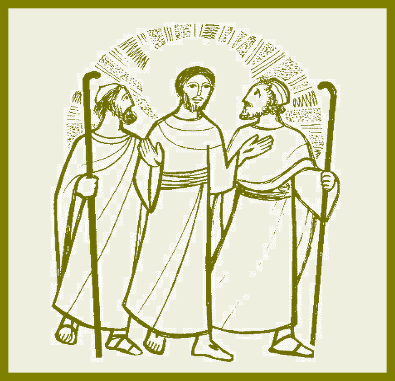Readings: Acts 2: 14, 22-33; 1 Peter 1:17-21; Luke 24:13-35
Luke’s famous account of the risen Jesus’ meeting with two of his disciples on the road to Emmaus is one of the most captivating stories ever written. It is beautifully crafted tale, recounted with great dramatic flair, humour, and gentle irony, and climaxing in a shared meal and an astonishing discovery. Little wonder that, in 2010, it was made into a movie, The Road to Emmaus, starring Bruce Marchiano in the role of Jesus. But it is more than a great story. It is a profound illustration of what the Christian life is all about: the movement from darkness to light, from despair to hope, and from desolation to consolation.
The setting of the story is important. It is the evening of Easter day and two disciples – Cleopas and a companion – are leaving Jerusalem and heading home to the village of Emmaus, about seven miles away. We do not know for certain where this village is, and it doesn’t really matter. What matters is that the two disciples, like all of us, are on a journey. Despondent and disillusioned, they are discussing the events that have happened recently in Jerusalem. Suddenly, out of the blue, they are joined by a mysterious stranger who asks them what they are discussing. With delightful irony they reply: ‘You must be the only person staying in Jerusalem who does not know the things that have been happening there these last few days’ (Lk 24:18). Nonplussed, the stranger, wanting to draw them out, asks, ‘What things?, and they tell him about the condemnation and horrific death of Jesus of Nazareth, ‘a prophet mighty in deed and word before God and all the people’ (Lk 24:19-20).
The stranger does not interrupt the two disciples as they tell him their story. Like Tommy Tiernan’ interviews with his Saturday night guests on RTE I, he allows them to express themselves freely until they voice the real reason for their sadness and disillusionment. ‘We had hoped’, they tell him, ‘that he [Jesus] was the one to redeem Israel’ (Lk 24:21). For them, redemption meant liberation from the tyranny of Roman domination and the freedom to forge their own destiny and live securely in their own land as God’s covenanted people. The crucifixion of their Master, Jesus, meant the complete shattering of this hope. They had thought that, in following Jesus, they had been on the road that led to freedom, but it turned out to be another cul-de-sac. Hence, their sorrow and acute disappointment.
Only when they have opened their hearts to him does the stranger speak again. Starting with what they already know, he tells the story of Israel in a new way ‘beginning with Moses and the prophets’ (Lk 24:27), showing them that what happened to Jesus, including his sufferings and death, far from being a tragedy was part of God’s plan all along. The death of Jesus was the achievement of his mission, not the end of it. As the significance of the stranger’s words begin to dawn on them, the two disciples reach their home and insist on the stranger staying with them.
As they sit down to the evening meal with their visitor, he now assumes the role of host. Luke tells us that ‘he took the bread, blessed and broke it, and gave it to them’ (Lk 24:30). In that very act, they recognised him as Jesus, now risen from the dead, though he immediately vanished from their sight. With that recognition, all that happened on the road, and everything the ‘stranger’ had said to them, suddenly made sense: ‘Did not our hearts burn within us as he talked to us on the road and explained the Scriptures to us?’ (Lk 24:32). Emboldened by their experience, and eager to tell their fellow disciples about it, they hurry back to Jerusalem, only to discover their that they, too, have good news for them: ‘that the Lord is risen indeed and has appeared to Simon’ (Lk 24: 34).
At the beginning of this homily, I stated that this wonderful story illustrates what the Christian life is all about. All the key elements are there: faith as a journey from darkness to light, from sorrow to joy; the value of having someone to accompany us and listen to our stories without interrupting us; the importance of hospitality and openness to the stranger; the recognition of the risen Jesus in the breaking of bread – another name for the Eucharist in the early Church; and the sharing of that experience with others. In every Eucharist, we are invited to open our hearts to the Lord, to tell him our stories, to listen to his enlightening Word and experience his living presence; and, then, with transformed hearts and minds, to share that experience with others.
I will end with a prayerful reflection from the pen of Flor McCarthy SDB, entitled, Jesus – life’s companion:
All through life’s day, you walk with us Lord.
But often we don’t recognise you,
for we are blinded by work and worry,
doubt confusion and fear,
and so you remain a stranger to us.
Before the day’s end we will ask you many questions,
experience many sorrows and disappointments.
Then, suddenly, whether we are young, middle-aged, or old,
we will find the night is approaching.
In that moment we pray,
that, like the disciples on the road to Emmaus,
our eyes will be opened, and that we will recognise you.
And you will not vanish from our sight,
but stay with us to guide us to the Father’s house.
Michael McCabe SMA
To listen to an alternative Homily for this Sunday, from Fr Tom Casey of the SMA Media Centre, Ndola, Zambia please click on the play button below.
|
|

